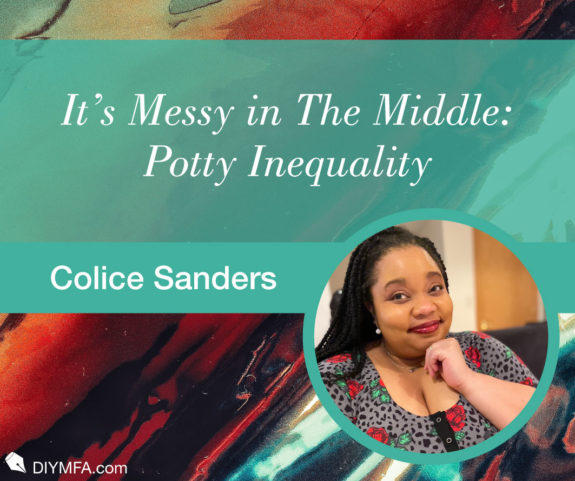Welcome back to It’s Messy in The Middle, where we reflect on ways to craft complex characters and build dynamic worlds that will connect with readers from underrepresented identity groups.
So far, we have established the importance of answering the call for diverse and inclusive writing by focusing on specific, honest, and intentional representations of marginalized communities. This requires us to be willing to be held accountable for our depictions and actively work to avoid the temptations of cultural appropriation. In this post, I will outline why we must make invisible systems of privilege and inequality visible to our readers.
Making the Invisible (Privilege), Visible
Privilege refers to the unearned power, access, and benefits that are granted to others based on their perceived membership to a majority group. On a personal level, the privilege encourages a person to see their life as morally neutral, normative, ideal, and often sanctioned by religion. Systematically, privilege is a gatekeeping tool legitimized by our laws, norms, and institutions.
We risk othering and objectifying underrepresented communities if we do not make the system’s privilege and inequality visible.
In our inclusive writing efforts, we also sometimes fall short of providing nuanced illustrations of privilege. Challenging ourselves to explore and illustrate privilege should be a universal standard of inclusive writing. However, when it comes to conversations about privilege, we mostly avoid or talk at each other instead of doing the work. Which makes the potty the perfect space to check in with and investigate our privileged identities. Whether you call it the bathroom, restroom, loo, commode, or toilet, I prefer to call it the potty.
The Great Equalizer?
We would assume that restrooms are a bias-free zone, a great equalizer because using the bathroom is one of the most basic needs of every human. However, public bathrooms have historically been used as exclusionary spaces to reinforce systematic inequality and privilege, commonly revolving around denying access (entry) and accessibility (usability) to marginalized groups.
A Brief Potty Politics Overview
Denied Access Based on Racial Identity
- The 1890’s introduction of Jim Crow laws led to an eventual banning of access to bathrooms (among other public spaces) deemed as whites-only in 1915.
- The 1964 Civil Rights Act was passed to prohibit racial discrimination in public places.
- In 1966, an African American man named Sammy Younge Jr. was murdered for trying to use a whites-only bathroom in Tuskegee, Alabama.
Denied Access and Accessibility Based on Physical Ability
- In 1961, the American National Standards Institute (ANSI) published a guide encouraging private entities to create accessible facilities for people with physical disabilities. This report documented the dismal number of buildings that offered entry and accessibility in public spaces.
- In 1990, the Americans with Disabilities Act (ADA) was passed, which prohibited discrimination based on disability in private and public sectors. This act kick-started the availability of accessible bathrooms (among other things).
Denied Access Based on Gender Identity
- From 2013-2017, nearly 60 different types of “bathroom bills” have been submitted into legislation to deny or greatly reduce access to restrooms and other facilities based on gender identity assigned at birth. There have been countless confrontations, assaults, and arrests seeking to enforce the spirit of these laws.
Take Your Character(s) To a Public Restroom
The brief history detailed above highlights a surprisingly long history of public bathroom politics. While I have chosen to focus on using the restroom to explore characters’ experiences with systematic inequality and privilege, there are many more everyday spaces that we could choose to investigate. How would your current characters experience a public restroom? Here are some questions to consider:
- Would their stomach rumble with anxiety and the fear of being confronted, assaulted, or arrested because of their gender identity or presentation?
- Would they feel frustrated at repeatedly waving their hands in front of automated faucets and hand dryers that were not designed to recognize dark skin?
- Would they say a silent prayer that no one is occupying the sole accessible stall since it is their only option?
- Would their heart drop in disappointment as they discover that there is no diaper-changing station for the squirming infant in their arms?
- Would they shake their head in disappointment as they shoved a wad of toilet tissue or paper towels in their pants because there is no sanitary napkin dispenser?
- Do they struggle to fit into the stalls, contorting their bodies and fighting through dispensers that dig into their hips and legs?
What would your character’s experience tell you about the nature of privilege and inequality and how it functions as a system?

Colice Sanders is a blogger and motivational speaker. Colice writes YA, poetry, and memoir. Her blog areasontorise.com chronicles her journey of radical self-acceptance through the lens of childhood trauma. You can reach her on Facebook, Twitter, or Instagram!







